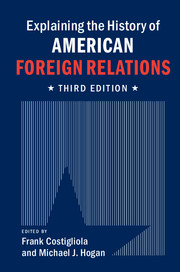Book contents
- Frontmatter
- Dedication
- Contents
- List of figures
- List of contributors
- Introduction
- 1 Theories of International Relations
- 2 National security
- 3 Corporatism: from the new era to the age of development
- 4 Explaining political economy
- 5 Diplomatic history after the big bang: using computational methods to explore the infinite archive
- 6 Development and technopolitics
- 7 Nonstate actors
- 8 Legal history as foreign relations history
- 9 Domestic politics
- 10 The global frontier: comparative history and the frontier-borderlands approach
- 11 Considering borders
- 12 The privilege of acting upon others: the middle eastern exception to anti-exceptionalist histories of the US and the world
- 13 Nationalism as an umbrella ideology
- 14 Nation Branding
- 15 Shades of sovereignty: racialized power, the United States and the world
- 16 Gendering American foreign relations
- 17 The religious turn in diplomatic history
- 18 Memory and the study of US foreign relations
- 19 The senses
- 20 Psychology
- 21 Reading for emotion
- Index
5 - Diplomatic history after the big bang: using computational methods to explore the infinite archive
Published online by Cambridge University Press: 05 March 2016
- Frontmatter
- Dedication
- Contents
- List of figures
- List of contributors
- Introduction
- 1 Theories of International Relations
- 2 National security
- 3 Corporatism: from the new era to the age of development
- 4 Explaining political economy
- 5 Diplomatic history after the big bang: using computational methods to explore the infinite archive
- 6 Development and technopolitics
- 7 Nonstate actors
- 8 Legal history as foreign relations history
- 9 Domestic politics
- 10 The global frontier: comparative history and the frontier-borderlands approach
- 11 Considering borders
- 12 The privilege of acting upon others: the middle eastern exception to anti-exceptionalist histories of the US and the world
- 13 Nationalism as an umbrella ideology
- 14 Nation Branding
- 15 Shades of sovereignty: racialized power, the United States and the world
- 16 Gendering American foreign relations
- 17 The religious turn in diplomatic history
- 18 Memory and the study of US foreign relations
- 19 The senses
- 20 Psychology
- 21 Reading for emotion
- Index
Summary
When the first edition of Explaining the History of American Foreign Relations was published in 1991, it would have been hard to explain to readers why historians would soon find computers indispensable for doing their research. Apple's first laptop, the “PowerBook 100,” went on sale that year with a 20MB hard drive, and it cost over $4000 in today's dollars. No digital cameras were available on the consumer market. The World Wide Web was only just emerging, mainly to facilitate communication among scientists. Library catalog terminals were difficult to use, and scholarly article databases still lay far in the future.
Now it is hard to imagine writing a book without word processing software and an internet connection. Whereas the contributors to that first edition a quarter century ago would have had to spend many hours at the library just to find book reviews and check citations, these tasks are done today with a few mouse clicks. Historians now take thousands of photographs in a single archival visit, collecting gigabytes of digitized documents. We are organizing them as text-searchable pdfs in annotated, cloud-based databases, a practice that would have filled previous generations of scholars with wonder.
Remarkable though they are, these are still just technical improvements on time-honored historical tradecraft. The keyboard and screen take the role of the typewriter, databases substitute for filing cabinets and card catalogs, and track changes replace sticky notes. But the advent of digital media and recent advances in information technology portend much more dramatic changes in the very nature of our field, as is already happening in law, journalism, and literary studies. We will soon face an avalanche of electronic records, far too many to cope with using traditional methods.
This chapter describes how scholars might use computational techniques to cope with what William McAllister has called the “Big Bang” in historical source materials. This explosion began with the sudden release of a quarter of a million cables by Wikileaks; a “data dump” now dwarfed by the 2.7 million electronic records available from the State Department's Central Foreign Policy Files (CFPF), spanning the years 1973–8. Even this pales in comparison with what is being created by newer forms of communication, such as the forty million emails generated by Bill Clinton's White House, and the two billion emails produced per year by Hillary Clinton's State Department.
Information
- Type
- Chapter
- Information
- Explaining the History of American Foreign Relations , pp. 74 - 101Publisher: Cambridge University PressPrint publication year: 2016
Accessibility standard: Unknown
- 2
- Cited by
